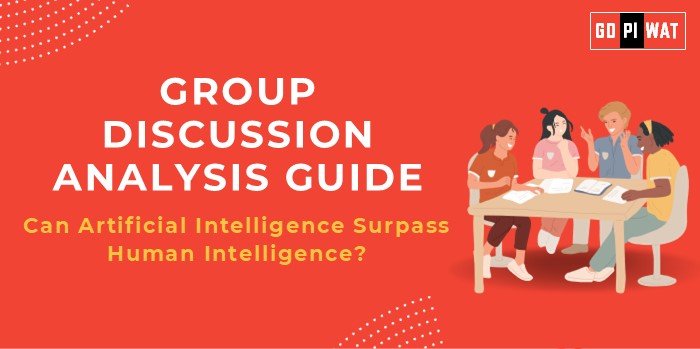📋 Group Discussion Analysis Guide: Can Artificial Intelligence Surpass Human Intelligence?
🌐 Introduction to the Topic
- 📜 Opening Context: Artificial Intelligence (AI) is at the forefront of technological innovation, transforming industries and challenging human capabilities in areas like creativity, logic, and decision-making. Its potential to surpass human intelligence sparks both excitement and ethical concerns globally.
- 📖 Background: The concept of AI traces back to the 1950s, evolving rapidly with milestones like Deep Blue defeating a chess grandmaster in 1997, and more recently, generative AI tools exceeding human benchmarks in creative and analytical tasks.
📊 Quick Facts and Key Statistics
- 💰 AI Market Size: $196 billion in 2023, expected to reach $500 billion by 2028, highlighting exponential growth in AI applications.
- 📈 GPT Performance: AI models like GPT-4 surpass human averages in standardized tests like SAT, demonstrating capabilities beyond specific human skillsets.
- 💼 Employment Impact: 375 million jobs globally may shift by 2030 due to AI, as per McKinsey reports.
- 🩺 Human Benchmarking: AI systems achieve 97% accuracy in medical imaging, compared to 87% for radiologists, showcasing domain-specific advantages.
👥 Stakeholders and Their Roles
- 🏛️ Governments: Regulating AI ethics and deployment (e.g., EU AI Act).
- 💻 Corporations: Innovating and deploying AI across sectors like healthcare, finance, and transportation.
- 🎓 Academia: Advancing AI research and training the workforce for an AI-driven economy.
- 👥 Public: Adapting to AI’s societal impacts, from job markets to privacy concerns.
🏆 Achievements and Challenges
✅ Achievements
- 🩺 Medical Advancements: AI surpasses human expertise in medical diagnosis (e.g., cancer detection).
- 🚗 Autonomous Vehicles: Reduce accident risks by up to 90%.
- 🎨 Generative AI: Democratizes creativity, aiding industries from advertising to architecture.
- 💬 Smart Assistants: Tools like Siri enhance daily productivity.
⚠️ Challenges
- 🤖 Lack of General Intelligence: AI lacks contextual understanding and intuition.
- ⚖️ Ethical Concerns: Bias in AI systems reflects societal inequalities.
- 🛠️ Dependence Risks: Over-reliance could erode critical human skills.
🌍 Global Comparisons
- 🇨🇳 China: Leads in AI patent filings, showcasing technological leadership.
- 🇪🇺 EU: Prioritizes ethical AI through the Artificial Intelligence Act.
📄 Case Studies
🔬 AlphaFold: Solved a 50-year protein folding problem, advancing biology and healthcare research.
📚 Structured Arguments for Discussion
- ✅ Supporting Stance: “AI’s exponential learning capabilities and scalability position it to surpass human limitations in logic and efficiency.”
- ❌ Opposing Stance: “Human intelligence is uniquely capable of contextual thinking, ethics, and emotional reasoning, which AI lacks.”
- ⚖️ Balanced Perspective: “AI excels in specific tasks but complements rather than surpasses the depth of human intelligence.”
💡 Effective Discussion Approaches
- 📊 Opening Approaches:
- Start with transformative examples (e.g., AI in healthcare).
- Highlight statistics showing AI dominance in specific fields.
- 💬 Counter-Argument Handling:
- Use ethical dilemmas to question AI’s reliability.
- Acknowledge AI’s strengths but stress human intuition and creativity as irreplaceable.
🔎 Strategic Analysis of Strengths and Weaknesses
- 💪 Strengths: Efficiency, scalability, domain-specific intelligence.
- ❌ Weaknesses: Ethical dilemmas, contextual limitations, reliance risks.
- 🌟 Opportunities: Collaboration with humans, societal problem-solving.
- ⚠️ Threats: Misuse, loss of human relevance.
🎓 Connecting with B-School Applications
📊 Real-World Applications
- 📈 AI in financial analytics, market predictions, and business strategy.
💬 Sample Questions
- 💭 “How can AI complement human decision-making in management?”
- 📜 “Evaluate ethical dilemmas in AI-driven industries.”
💡 Insights for Students
- 📚 Explore AI’s role in innovation, ethical frameworks, and operational efficiency.


